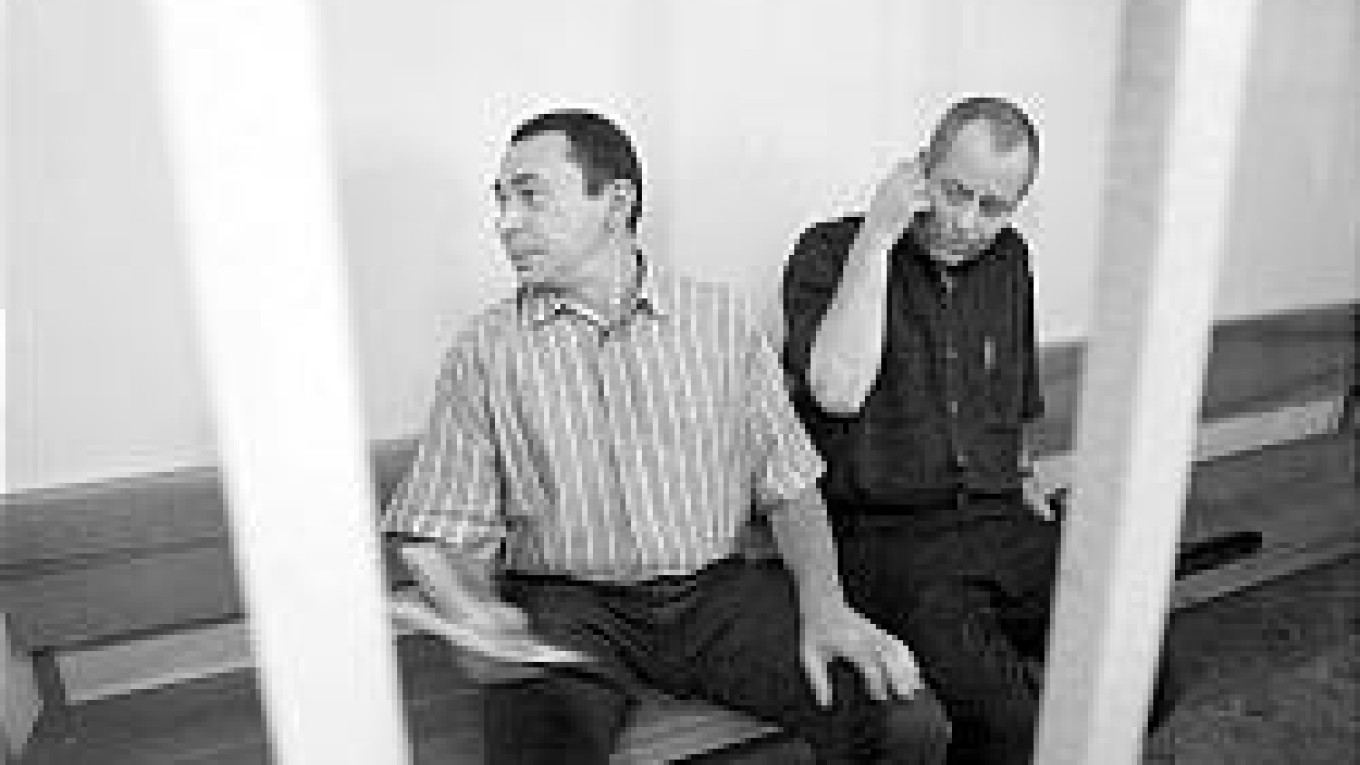The Prosecutor General's Office, however, is pressing criminal charges that include abuse of authority, large-scale misappropriation of entrusted property, use of fake documentation and laundering illegally gained funds.
Sibur and Gazprom notified Judge Lyubov Zvyagina that they were withdrawing their civil suits.
"The material harm caused to Sibur by Goldovsky was returned in full and therefore Sibur has no claim against him," said Valeria Adamova, a Sibur vice president in charge of legal affairs.
Both companies said they had notified prosecutors that they were withdrawing their claims, which was unnecessary, since the prosecutor's office has no jurisdiction in civil lawsuits. If the move was "meant as a signal that it was time to wind up the criminal case," as one law enforcement official said, "the signal, so far, has been ignored."
When lawyers for the defendants requested that Goldovsky and Koshchits be released on bail, prosecutor Dmitry Shokhin objected, and the judge sustained the objection. The lawyers had different grounds for their petition. Goldovsky's lawyer Anatoly Kleimenov said his client was being kept in a "medical institution," while Koshchits' lawyers complained that their client was being kept in "inhumane conditions."
For a man who was supposed to be ill, Goldovsky looked particularly well. The former Sibur president arrived at the court in a civilian minibus, though guards were present. Meanwhile, a handcuffed and exhausted-looking Koshchits was brought to court in a truck used to transport prisoners.
It emerged during the hearing that Goldovsky was being kept in the medical block of the ZiL car factory while Koshchits was being held in a standard cell in Butyrskaya prison.
After the judge decided that both men should remain under arrest, Shokhin read the charges.
In his presentation, Shokhin revealed a number of details about the accusations that had never before come to light. According to investigators, Goldovsky acted as part of a criminal group that included Koshchits, deputy head of Sibur's corporate department Larisa Abramenko, and an Austrian citizen named Boris Blagerman, who heads Austrian Petrochemical Trading.
With their help, Shokhin said, Goldovsky organized the sale at a deflated price of shares in the Tobolsk Petrochemicals Plant to two offshore companies that resold the shares to other offshore companies (a total of 59 offshores are mentioned in the case).
Eventually the shares were bought by companies controlled by Goldovsky -- at a higher price. In order to make the purchase, Sibur's funds were used, which harmed the company to the tune of 3.8 billion rubles ($120 million).
According to Shokhin, the money received from the sale was used by Blagerman to buy 15.74 percent of Hungary's Borsodchem, the second-largest producer of polyvinylchloride (PVC) in Eastern Europe, as well as 4.5 percent of TVK, Hungary's largest petrochemicals plant, from Irish-registered Milford.
Shokhin's indictment included the tale of the now-canceled third issuance of Sibur shares, which diluted Gazprom's share in the company. The prosecutor's office said that Goldovsky abused his authority when he sold 5 percent of the ill-gotten issuance in October 2001 to Gazoneftekhimicheskaya Kompaniya, or GNK, which Koshchits then headed.
GNK, Shokin said, belongs to Goldovsky personally via the offshore company Oxil, which he founded. Investigators also established that Goldovsky presented Gazprom with a faked shareholders register before an extraordinary general meeting of shareholders planned for Jan. 9, which contained false information that the stake belonged to GNK.
The trial is due to resume Monday, and hundreds of witnesses remain to be heard.
A Message from The Moscow Times:
Dear readers,
We are facing unprecedented challenges. Russia's Prosecutor General's Office has designated The Moscow Times as an "undesirable" organization, criminalizing our work and putting our staff at risk of prosecution. This follows our earlier unjust labeling as a "foreign agent."
These actions are direct attempts to silence independent journalism in Russia. The authorities claim our work "discredits the decisions of the Russian leadership." We see things differently: we strive to provide accurate, unbiased reporting on Russia.
We, the journalists of The Moscow Times, refuse to be silenced. But to continue our work, we need your help.
Your support, no matter how small, makes a world of difference. If you can, please support us monthly starting from just $2. It's quick to set up, and every contribution makes a significant impact.
By supporting The Moscow Times, you're defending open, independent journalism in the face of repression. Thank you for standing with us.
Remind me later.


